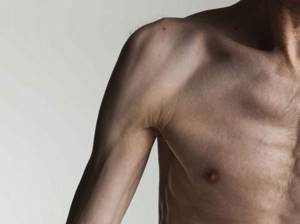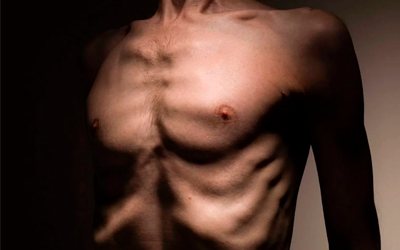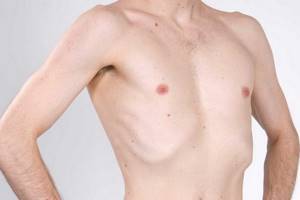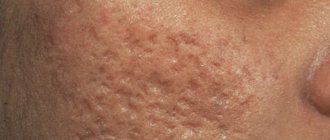Anorexia in men is not a common phenomenon. Belongs to the group of eating disorders. Represents a deliberate pathological desire to reduce weight. Accompanied by fear of obesity, distorted perception of one's own body, denial of the problem, constant concern about one's appearance and nutrition, and self-pity.
Experts say that male anorexia has its own characteristics. According to approximate data, the peak incidence in women is observed in the age range of 15-20 years. And in men at a later age (21-25 years).
Articles on the topic
- It is important to know the main directions of psychotherapy and apply them correctly 01/27/2021
- Main tasks and methods of person-oriented psychotherapy 01/27/2021
- Generalized anxiety - daily struggle with fear 12/14/2020
- Existential anxiety: how to escape the inevitable 12/14/2020
How to suspect a disease
The most characteristic symptom is persistent weight loss. A man with anorexia does not stop losing weight, even when his body is exhausted. The fact is that the disease is based on psychopathological processes - a strong fear of gaining weight, changing the shape of the body. A young man takes several steps to lose weight. One of them is strict calorie restriction. At the same time, he avoids joint feasts with relatives, brings food to his room, hides there, throws out food, returning empty plates.
Then the increasing need to lose weight and the fear of gaining weight lead to the use of laxatives and provoking vomiting. The disease worsens, appetite disappears, and an obsessive thought about losing weight appears. Attempts by relatives to overcome poor nutrition are met with strong resistance and all kinds of denial of the problem. Despite significant exhaustion, patients often do not feel that they are in a serious condition and remain physically active.
A man with anorexia nervosa is not satisfied with his appearance , does not accept his body and continues to lose weight, even after reaching the target weight .
Symptoms of the disease
Symptoms in the initial stages do not always make it possible to make a diagnosis and begin treatment on time. Here it is important to approach the assessment of a man’s condition comprehensively and look for the following symptoms of the disease:
- a person is overly critical of his appearance, figure in reflection, in videos or photographs;
- an anorexic considers thinness ideal;
- refuses to communicate with family and friends, prefers solitude;
- behavior may be unreasonably aggressive;
- the next meal causes fear;
- a person is overly keen on diets, preferring the most stringent of them;
- a man’s attraction to the opposite sex disappears, erectile function weakens;
- non-standard approach to eating - the contents of the plate are carefully crushed, the patient prefers to eat standing, exclusively alone, other strange habits appear;
- There is a total passion for sports, and physical activity follows immediately after eating.
In addition, it is worth noting the physiological signs of the disease, which are manifested by a painful appearance, fatigue, low levels of hemoglobin in the blood, which often results in fainting, hair loss, inflamed teeth and gums, and other ailments.

Types of anorexia
There are two types of anorexia in men:

- Restrictive (restrictive) - the patient limits food intake to very small quantities and uses laxatives irregularly.
- Bulimic-laxative - The patient usually limits the amount of food he eats, but he also regularly experiences periods of overeating or provocative vomiting and excessive use of laxatives and diuretics. The methods used usually lead to biochemical disturbances and organ dysfunction.
It should also be emphasized that the course of the disease is divided into: episodic, one-time, chronic, persistent and recurrent .
“Sometimes parents associate caring with food.”
– The way our body influences our lives is transmitted not only through the media. Family upbringing also plays an important role. Families with overcontrolling or lack of emotional support from parents are at high risk for eating disorders. In the first case, hyperstandards are imposed on the child: “You should be taller, stronger, more beautiful,” and in the second, they do not pay due attention to psychological problems.
Many future parents claim that they will accept their child as anyone. However, a study was conducted where expectant parents were asked to comment on photographs of their children. They were shown photographs of an overweight child, an average-weight child, and a thin child. However, the vast majority of parents-to-be said: “Thin children are more attractive, friendly and smart.” They also said that they would like to have a slim child rather than an overweight one. That is, it is not difficult to imagine what those parents who have certain expectations from their children about their appearance can tell their children.
My colleagues and I examined the case of a woman who experienced an episode of anorexia in her youth. Years passed and she now became obsessed with dieting. Everything would be fine, but her teenage daughter adopted her eating habits. Now they, like two girlfriends, count calories and constantly discuss what diet they will be on next month. That is, from childhood, the mother conveyed to her daughter the behavior where food intake should be controlled, because gaining weight is scary and bad.
There is another stereotype associated with family education - “boys should eat more” or “food is power.” All this can contribute to the practice of overeating from childhood. This is how an erroneous idea of the body and nutritional culture is formed. Sometimes people associate caring with food so much that they begin to harm the child.
One of my friends has been a plump girl since childhood. In her family, refusing to eat was considered an insult: “Do I cook poorly?” – her mother was offended. Therefore, as a child, she had to eat a lot, even when she didn't feel like it. When she grew up and moved out, so that her parents would not be bored, my friend gave them a cat.
Two things surprised me in this story: the fact that my friend’s weight successfully returned to normal after the move, and the fact that her mother also began to worry about the cat when, in her opinion, he was not eating enough. Ultimately, the cat was overfed, became seriously ill and died. This story shows well how for some people food and eating become a kind of expression of love and significance. But in children, excess weight can lead to eating disorders. Not only because a nutrition culture is not formed, but also because such children often face insults and rejection from their peers precisely because they are overweight. This is how thoughts about conformity and striving for invented ideals appear.
What can anorexia lead to in men?
A deficiency of vitamins and nutrients disrupts the normal functioning of internal organs . Men with anorexia often experience chronic fatigue, headaches, and problems with memory and concentration. Weight loss leads to anemia, atrophy of the cerebral cortex, which in turn causes irritability, neuropsychological disorders and seizures. As a result of the loss of adipose tissue and a significant decrease in the level of metabolism, thermoregulation processes are disrupted, and patients freeze.
With significant depletion of the body, hormonal imbalances occur, disorders of the digestive and cardiovascular systems, including atrophy of the heart muscle. Fuzz (lanugo) appears on the skin and nails become brittle. The most frightening thing is the emaciated body, often resembling a skeleton covered in skin. Severe exhaustion ends in death.
Causes
Taking into account the fact that men have a completely different psychological make-up, the reasons for their anorexia will be somewhat different, although at certain points they overlap. Most often this is:
- obesity in childhood, which entails problems with peers;
- digestive problems, poor appetite, poor eating habits (lack of diet, predominance of unhealthy foods in the diet);
- improper upbringing - parental overprotection, which results in so-called mama's boys - they are not accustomed to independent life, cannot solve problems, are infantile and exalted in a feminine way;
- character traits such as emotional coldness, unsociability, isolation;
- low self-esteem, internal complexes;
- mental illness;
- professional activities (actors who urgently need to lose weight for some role and who then cannot stop; male models, for whom there are also special parameters for a beautiful figure; musicians and singers who, due to touring, are forced to eat irregularly and of poor quality, etc. .d.);
- heredity.
In addition, men are increasingly diagnosed with anorexia, dictated by factors such as vegetarianism and sports drying of the body. Both phenomena seem to be beneficial for health, but in inept hands they become a trigger for the development of this disease.
Much less often than in women, the cause is stressful situations, emotional experiences, and problems in life. Although in some cases they are also noted.
Diagnosis of anorexia in honey
When making a diagnosis, our specialists are guided by clear criteria developed by psychiatric societies.
In doing so, we pay attention to:

- Intense fear of gaining weight despite being underweight.
- Failure to maintain weight appropriate for age and height.
- Impaired perception of one's own body (its weight and shape), underestimation of too low mass.
- Loss of libido, problems with erection.
- Body mass index BMI is below 17.5.
It is worth remembering that in addition to the main criteria, we also take into account many other factors. Particular attention is paid to identifying depressive disorders. Another important task for doctors is differentiating a mental disorder from sudden weight loss caused by some disease, physical or mental fatigue.
Risk factors
Males are less likely to seek the help of specialists, so there are risk factors that, if you pay attention to, can help you avoid a medical diagnosis. The following factors are distinguished:
- one of your relatives is overweight;
- innate or environmentally shaped perfectionism;
- work in the fashion and beauty industry;
- a state of excessive emotional stress associated with the fear of not meeting the expectations of parents;
- psychological or sexual violence.
Cost of services
| CONSULTATIONS OF SPECIALISTS | |
| Initial consultation with a psychiatrist (60 min.) | 3,500 rub. |
| Repeated consultation | 2,500 rub. |
| Consultation with a psychiatrist-narcologist (60 min.) | 3,500 rub. |
| Consultation with a psychologist | 2,500 rub. |
| Consultation with Gromova E.V. (50 minutes) | 12,000 rub. |
| PSYCHOTHERAPY | |
| Psychotherapy (session) | 6,500 rub. |
| Psychotherapy (5 sessions) | 25,000 rub. |
| Psychotherapy (10 sessions) | 48,000 rub. |
| Group psychotherapy (3-7 people) | 3,500 rub. |
| Hypnosis (1 session) | 10,000 rub. |
| Hypnotherapy course (5 sessions) | 45,000 rub. |
| Psychotherapy session with E.V. Gromova (50 minutes) | 12,000 rub. |
| TREATMENT IN A HOSPITAL | |
| Ward for 4 persons | 8,500 rub./day |
| Ward for 3 persons | 9,500 rub./day |
| Ward for 2 persons | 11,500 rub./day |
| Ward for 2 persons Comfort | 12,500 rub./day |
| Ward 1 bed VIP | 16,500 rub./day |
This list does not contain all prices for services provided by our clinic. The full price list can be found on the “Prices” , or by calling: 8(969)060-93-93. Initial consultation is FREE!
Signs

In men, anorexia manifests itself in a special way. If in women the disease affects primarily the sexual sphere (menstruation is interrupted and then completely disappears, there is no libido, no interest in sex), then the stronger sex does not experience any special problems in this regard (at least if we are not talking about advanced stage). Otherwise the symptoms are very similar:
- apathy;
- abdominal pain, stool disorders and other digestive problems;
- fast fatiguability;
- dizziness, headaches;
- hungry fainting;
- depression;
- sleep disorders;
- unhealthy, gray complexion;
- refusal to eat, lack of appetite;
- mood swings;
- weight loss, unhealthy thinness, lack of muscle mass;
- irritability;
- gag reflex when eating large amounts of food;
- deterioration of hair, teeth and nails.
Outwardly, a man suffering from anorexia looks exhausted, constantly tired, has a dull look, bruises under the eyes, and sunken cheeks. Based on the results of a medical examination and tests, problems with internal organs are identified:
- anemia;
- gastritis;
- hormonal disorders;
- leukopenia and leukocytosis;
- liver and kidney pathologies;
- gallbladder problems;
- malfunction of the pancreas;
- thrombocytosis;
- enterocolitis.
All these signs point to anorexia. But only a few men admit to themselves and others (at least to doctors) that they suffer from this disease. Most often, they are deeply convinced that they lead a healthy lifestyle: they eat little, play sports, and protect themselves from stress and anxiety. As a result, they end up in a hospital bed in a very neglected state, and then by force (under pressure from relatives, friends, neighbors).
Treatment of male anorexia

The earlier the disease is detected, the more successful and shorter the treatment will be, and the greater complications will be avoided. At the same time, all efforts of doctors will be aimed at changing the perception of oneself and restoring the body. In most cases, hospitalization will be required for conditions that do not yet pose a direct threat to life—isolation of a teenager or man from a toxic environment. Anorexic should change school or job and look for new friends.
Relatives should understand that forcing them to eat will not help. Treatment should be comprehensive and include both drug support and psychotherapy. Particular attention is paid to teaching the principles of rational nutrition. There is no one-size-fits-all solution. It takes a long time for a person to return to life.
Unfortunately, some patients seek help too late. Then doctors can only relieve the pain and prolong the patient’s life.
But even after recovery, the patient must undergo regular medical examinations and for the rest of his life avoid contact with people who had a negative influence on him.
Want to know more? Do you need to consult about the condition of a loved one? Just dial 8(969)060-93-93!
“Men were secretly allowed to look a little better than a monkey.”
The female body has been objectified for a very long time: now through advertising and mass culture, and earlier through art - artists loved to depict naked female bodies, without placing emphasis on the personal qualities and intelligence of women.
“Nowadays, women more often suffer from eating disorders,” confirms Lyudmila, “and all because strict demands are placed on the female body, which are broadcast through the media, advertising, music, books and films. A woman is expected to always take care of her body, appearance and be “forever young.” But men have always been secretly allowed to look “a little better than a monkey.” They were more often assessed according to other criteria: for example, success, intelligence and strength.
– Why do we continue to believe that being thin and slim is right?
– One of the reasons is the clear association of thinness with health. If you look through magazines like Cosmopolitan, you will see that a large number of articles about diets, healthy eating and a slim body are in one section - “Beauty and Health”.
It turns out this connection: diet is health plus beauty. That is why people who are even slightly overweight often feel guilty and their body “bad” not only from the point of view of society, but also from medicine.
But our body is programmed so that we eat, which means that any uncontrolled diet will lead to a breakdown. After each breakdown, a person has a terrible feeling of guilt, which affects self-esteem - this is psychological harm.
For example, on one of the sites where women share their diets and have been practicing them for decades, you can see how they begin to hate themselves for an “unauthorized” piece of cake. Ultimately, they associate food not with pleasure, energy and strength, but with a depressing feeling of guilt and fear. Such an emotional state at any time can develop into depression and increased anxiety, as well as eating disorders.











